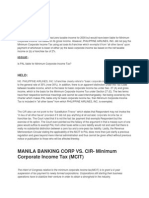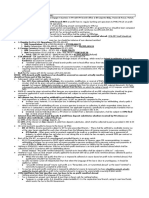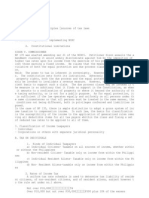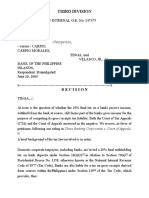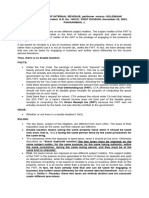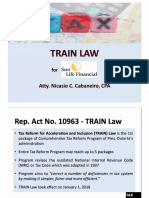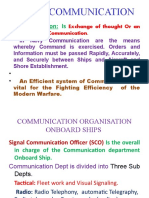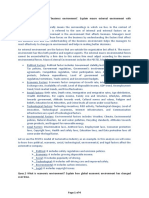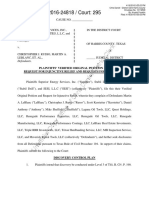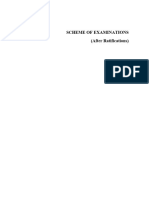Adamson Central Bar Operations: Taxation Law Section 28 (5) (B), NIRC
Adamson Central Bar Operations: Taxation Law Section 28 (5) (B), NIRC
Uploaded by
BasmuthCopyright:
Available Formats
Adamson Central Bar Operations: Taxation Law Section 28 (5) (B), NIRC
Adamson Central Bar Operations: Taxation Law Section 28 (5) (B), NIRC
Uploaded by
BasmuthOriginal Description:
Original Title
Copyright
Available Formats
Share this document
Did you find this document useful?
Is this content inappropriate?
Copyright:
Available Formats
Adamson Central Bar Operations: Taxation Law Section 28 (5) (B), NIRC
Adamson Central Bar Operations: Taxation Law Section 28 (5) (B), NIRC
Uploaded by
BasmuthCopyright:
Available Formats
ADAMSON CENTRAL BAR OPERATIONS
TAXATION LAW
Section 28 (5)(b), NIRC:
A final withholding tax at the rate of 15% is hereby imposed on the amount of cash and/or property
dividends received from a domestic corporation, which shall be collected and paid provided in Section 57
(a) of this Code, subject to the condition that the country in which the non-resident foreign corporation is
domiciled shall allow a credit the tax due from the non-resident foreign corporation taxes deemed to have
been paid in the Philippines equivalent to 20% for 1997, 19% for 1998, 18% for 1999, 17% thereafter,
which represents the difference between the regular income tax of 35% in 1997, 34% in 1998, 33%
in 1999, and 32% thereafter on corporations and the 15% tax on dividends as provided in this
subparagraph.
TAX SPARING RULE
Involves inter-corporate dividends received by a non-resident foreign corporation from a
domestic corporation
Only 15% final withholding tax on cash and/or property dividends is imposed
Provided the country in which the non-resident foreign corporation is domiciled shall allow a credit
against the tax due form the non-resident foreign corporation taxes deemed to have been paid in
the Philippines, which is 32% by 2000 [Sec. 28, (B) (5) (b)]
TAX SPARING CREDIT RULE
Situation: NRFC received dividend, cash or property dividend from DC. That dividend received
from DC is subject to 15% FINAL WITHHOLDING TAX.
This 15% may be imposed on this dividend received from DC if the foreign government of the
NRFC allows a tax credit at least 19% (1998), 18% (1999), 17% (2000). It should be credited form the
taxed deemed paid by this NRFC in the Phils.
If so, the foreign government does not allow a tax credit of at least 19%, the tax there is not 15%
but 34%. Thus the tax spared or saved is 19% because normally the tax is 34%. So, 34% less 15%
equals 19%, that is the tax saved and that represents the tax credit allowed by the foreign government.
Question: Must the foreign government actually grant a tax credit or is it enough that the foreign
government allow such tax credit?
Answer: There is no statutory provision that requires actual grant. Neither is there a Revenue
Regulation requiring actual grant. It is clear that the provision of the law says allows. SO, it is enough
to prove that the foreign corporation allows a tax credit. It is not incumbent upon the foreign corporation
to prove the amount actually granted.
Question: Does a withholding agent or a subsidiary corp. have the personality to fila a written
claim or refund?
Answer: The withholding agent has the personality to file a written claim for refund. A
withholding agent is technically a taxpayer because it is required to deduct and withhold the tax, and it
has the obligation to remit the same to the govt. So, withholding agent is liable for tax. It has therefore
the personality to file a written claim for refund.
Withholding agent is not only an agent of the taxpayer but also an agent of the government.
Since it is an agent of the taxpayer, it is ipso facto authorized to file a written claim for refund.
-
To justify an accumulation of earnings and profits for the reasonable anticipated
future needs, such accumulations must have been used within a reasonable time after the close of a
taxable period.
- Immediacy Test If the corporation did not prove an immediate need for accumulation of earnings, the
accumulation was not for reasonable needs of the business, and the surtax would apply.
Offshore Banking Units authorized by the Bangko Sentral ng Pilipinas (BSP) [Sec. 28 (A) (4) as
amended by RA 9294 (2004)]
Tax Rate: Exempt from all taxes, except net income from such transactions as may be specified by the
Secretary of Finance, upon recommendation of the Monetary Board to be subject to the regular income
tax payable by banks.
ADAMSON CENTRAL BAR OPERATIONS
EXCEPTION: Interest income derived from foreign currency loans granted to residents other than
offshore banking units or local commercial banks, including local branches of foreign banks that may be
authorized by the BSP to transact business with offshore banking units, shall be subject only to a final tax
at the rate of 10%.
Tax Coverage: ONLY income derived by offshore banking units from foreign currency transactions with:
1. Nonresidents
2. Other offshore banking units
3. Local commercial banks including branches of foreign banks that may be authorized by the Bangko
Sentral ng Pilipinas (BSP) to transact business with offshore banking units
CONCEPT OF DOUBLE TAXATION
Kinds of Double Taxation
A. DIRECT DUPLICATE
taxing same person, property or right twice
for the same purpose
by the same taxing authority
within the same jurisdiction or taxing district
within the same taxable period
and they must be of the same kind or character of tax
B. INDIRECT DUPLICATE
Exists if any of the elements for Direct taxation is not present
No constitutional prohibition on double taxation. However, where there is direct duplicate taxation then
there may be violation of the constitutional precepts of equal protection and uniformity in taxation.
TAX TREATY AS A MODE OF ELIMINATING
DOUBLE TAXATION:
1) EXEMPTION METHOD the income or capital which is taxable in the state of source or situs is
exempted in the state of residence, although in some instances it may taken into account in determining
the rate of tax applicable to the tax payers remaining income or capital (ex. Tax Sparing Credit scheme)
2) CREDIT METHOD the tax paid in the state of source is credited against the tax levied in the state of
residence
You might also like
- Jataka Parijata Vol 1 3 PDFDocument1,094 pagesJataka Parijata Vol 1 3 PDFSiva Prasad Tata100% (3)
- Unit Plan - Social StudiesDocument5 pagesUnit Plan - Social Studiesapi-361167927No ratings yet
- 4 Marubeni - Corp. - v. - Commissioner - of - Internal PDFDocument10 pages4 Marubeni - Corp. - v. - Commissioner - of - Internal PDFdenbar15No ratings yet
- Taxation LawDocument107 pagesTaxation LawDave A ValcarcelNo ratings yet
- Taxation 2 Case DigestDocument13 pagesTaxation 2 Case DigestRoger John Caballero Fariñas IINo ratings yet
- Tax SparingDocument5 pagesTax Sparingfrancis_asd2003No ratings yet
- Marubeni Is A Non-Resident Foreign Corporation With Respect To The Transaction in QuestionDocument3 pagesMarubeni Is A Non-Resident Foreign Corporation With Respect To The Transaction in Questionarden1imNo ratings yet
- WithholdingTaxes ModuleDocument18 pagesWithholdingTaxes ModuleRovi Anne IgoyNo ratings yet
- Part2 TaxDocument4 pagesPart2 TaxJoenalyn Mae Gamboa GalangNo ratings yet
- Petitioner vs. vs. Respondents Melquiades C Gutierrez The Solicitor GeneralDocument9 pagesPetitioner vs. vs. Respondents Melquiades C Gutierrez The Solicitor Generalthirdy demaisipNo ratings yet
- Preweek Taxation Law Atty. William Benson S. GanDocument207 pagesPreweek Taxation Law Atty. William Benson S. Ganjamillabercedes24No ratings yet
- Bank of America Vs CADocument2 pagesBank of America Vs CAPretzel TsangNo ratings yet
- O. Taxation of Resident Foreign CorporationsDocument8 pagesO. Taxation of Resident Foreign CorporationsJezreel Y. ChanNo ratings yet
- Taxation and Fiscal RegulationsDocument9 pagesTaxation and Fiscal RegulationsAparna SinghNo ratings yet
- That Stock Dividends Are Property and Not Income, and Hence That The Tax Here in Question Is A Property and Not An Income Tax (Rubio vs. CIR)Document16 pagesThat Stock Dividends Are Property and Not Income, and Hence That The Tax Here in Question Is A Property and Not An Income Tax (Rubio vs. CIR)Geralyn GabrielNo ratings yet
- G.R. No. 147375 June 26, 2006 Commissioner of Internal Revenue, Petitioner, Bank of The Philippine Islands, RespondentDocument11 pagesG.R. No. 147375 June 26, 2006 Commissioner of Internal Revenue, Petitioner, Bank of The Philippine Islands, RespondentShie DiazNo ratings yet
- Income Tax Table - NIRCDocument6 pagesIncome Tax Table - NIRCgoateneo1bigfightNo ratings yet
- Taxation in The PhilippinesDocument7 pagesTaxation in The Philippinesjohnamoc2No ratings yet
- MARUBENI CORPORATION vs. COMMISSIONER OF INTERNAL REVENUE AND COURT OF TAX APPEALSDocument3 pagesMARUBENI CORPORATION vs. COMMISSIONER OF INTERNAL REVENUE AND COURT OF TAX APPEALSDkNarcisoNo ratings yet
- G.R. No. 147375 June 26, 2006 Commissioner of Internal Revenue, Petitioner, Bank of The Philippine Islands, RespondentDocument39 pagesG.R. No. 147375 June 26, 2006 Commissioner of Internal Revenue, Petitioner, Bank of The Philippine Islands, RespondentMadel PresquitoNo ratings yet
- TaxLawRev1 UpdatedDocument277 pagesTaxLawRev1 UpdatedKaira TanhuecoNo ratings yet
- Tax Law ReviewDocument8 pagesTax Law ReviewIon FashNo ratings yet
- Income TaxDocument32 pagesIncome TaxAeiaNo ratings yet
- Marubeni Corp V CirDocument3 pagesMarubeni Corp V CirTintin CoNo ratings yet
- UntitledDocument127 pagesUntitledemielyn lafortezaNo ratings yet
- Tax Law ReviewerDocument123 pagesTax Law ReviewerliboaninoNo ratings yet
- Axsdaqgasdgasdg 123123 Aeasdfw SadgDocument6 pagesAxsdaqgasdgasdg 123123 Aeasdfw SadgMark LimNo ratings yet
- CIR v. BPI, G.R. No. 147375, 2006Document12 pagesCIR v. BPI, G.R. No. 147375, 2006BREL GOSIMATNo ratings yet
- Taxation Reviewer 1Document110 pagesTaxation Reviewer 1bigbully23No ratings yet
- Withholding Tax: Bar Examination Questions and Answers in TaxationDocument14 pagesWithholding Tax: Bar Examination Questions and Answers in TaxationSophia OñateNo ratings yet
- Taxrerv DigestDocument5 pagesTaxrerv DigestzaneNo ratings yet
- Tax Digests Sections 31 To 33Document8 pagesTax Digests Sections 31 To 33Lani LauretteNo ratings yet
- CIR vs. Bank of Commerce (2005)Document16 pagesCIR vs. Bank of Commerce (2005)BenNo ratings yet
- Marubeni v. CIR DigestDocument4 pagesMarubeni v. CIR DigestStradivariumNo ratings yet
- Digested (Income Tax)Document8 pagesDigested (Income Tax)DutchsMoin MohammadNo ratings yet
- 15 Withholding TaxDocument14 pages15 Withholding TaxHaRry PeregrinoNo ratings yet
- G.R. No. 184398, February 25, 2010: Gross Philippine Billings Off Line CarrierDocument7 pagesG.R. No. 184398, February 25, 2010: Gross Philippine Billings Off Line Carriermarky2121No ratings yet
- Taxation Midterm ReviewerDocument5 pagesTaxation Midterm ReviewerMaria RochelleNo ratings yet
- Cir Vs Bank of Commerce DigestDocument3 pagesCir Vs Bank of Commerce Digestwaws20No ratings yet
- GR 147375 - Cir Vs BirDocument15 pagesGR 147375 - Cir Vs BirMarianRapadasNo ratings yet
- GR No. 149636 - June 8, 2005 Double Taxation FWT - GRTDocument4 pagesGR No. 149636 - June 8, 2005 Double Taxation FWT - GRTMonica SorianoNo ratings yet
- Lecture-Corporate-Income-Tax 2Document5 pagesLecture-Corporate-Income-Tax 2Ragelli Mae NatalarayNo ratings yet
- Taxation of CorporationsDocument26 pagesTaxation of CorporationsjolinaNo ratings yet
- CIR vs. Solidbank Corporation, G.R. No. 148191Document19 pagesCIR vs. Solidbank Corporation, G.R. No. 148191Shay GCNo ratings yet
- Kinds of Income TaxesDocument9 pagesKinds of Income TaxesRon RamosNo ratings yet
- Section 28 Create LawDocument26 pagesSection 28 Create LawsasanllidoalfredaNo ratings yet
- National TaxationDocument18 pagesNational TaxationShiela Joy CorpuzNo ratings yet
- Other CasesDocument10 pagesOther CasesJermaine SemañaNo ratings yet
- Pretest in TranstaxDocument33 pagesPretest in TranstaxAllan SantosNo ratings yet
- A Guide To Taxation in The PhilippinesDocument5 pagesA Guide To Taxation in The PhilippinesNathaniel MartinezNo ratings yet
- Taxation (Income Tax) - Pp41-60Document37 pagesTaxation (Income Tax) - Pp41-60Iya PadernaNo ratings yet
- 02 Corporate Income TaxDocument10 pages02 Corporate Income TaxbajujuNo ratings yet
- CIR v. AmEx (Digest)Document3 pagesCIR v. AmEx (Digest)Tini GuanioNo ratings yet
- CASES - DigestDocument11 pagesCASES - DigestChameNo ratings yet
- TRAIN LawDocument38 pagesTRAIN LawJorrel BautistaNo ratings yet
- MARUBENI Vs CIR TAXDocument2 pagesMARUBENI Vs CIR TAXLemuel Angelo M. EleccionNo ratings yet
- Direct Taxation: CA M. Ram Pavan KumarDocument60 pagesDirect Taxation: CA M. Ram Pavan KumarSravyaNo ratings yet
- Commissioner of Internal Revenue V Solidbank CorporationDocument2 pagesCommissioner of Internal Revenue V Solidbank CorporationMarj CenNo ratings yet
- 1040 Exam Prep - Module I: The Form 1040 FormulaFrom Everand1040 Exam Prep - Module I: The Form 1040 FormulaRating: 1 out of 5 stars1/5 (3)
- 1040 Exam Prep Module III: Items Excluded from Gross IncomeFrom Everand1040 Exam Prep Module III: Items Excluded from Gross IncomeRating: 1 out of 5 stars1/5 (1)
- Affidavit-Of-Unavailability-Of-Employment-Records 2Document2 pagesAffidavit-Of-Unavailability-Of-Employment-Records 2BasmuthNo ratings yet
- Wenphil, Serrano & AgabonDocument1 pageWenphil, Serrano & AgabonBasmuthNo ratings yet
- Affidavit of Residency 2Document4 pagesAffidavit of Residency 2Basmuth100% (2)
- Natividad Bautista-Borja Vs Illuminada BAutistaDocument4 pagesNatividad Bautista-Borja Vs Illuminada BAutistaBasmuthNo ratings yet
- Alcantra & Sons vs. CADocument15 pagesAlcantra & Sons vs. CABasmuthNo ratings yet
- Theory of Absorption: Supra, at P. 528)Document10 pagesTheory of Absorption: Supra, at P. 528)BasmuthNo ratings yet
- Bar QuestionsLAborDocument50 pagesBar QuestionsLAborBasmuthNo ratings yet
- Red Notes LaborDocument89 pagesRed Notes LaborBasmuth50% (2)
- Warehouse Receipt Law 3Document10 pagesWarehouse Receipt Law 3Basmuth100% (1)
- Negotiable Instruments MemoryAidDocument11 pagesNegotiable Instruments MemoryAidMOSB10No ratings yet
- Election LawsDocument13 pagesElection LawsBasmuthNo ratings yet
- Night Shift Differential in The PhilippinesDocument6 pagesNight Shift Differential in The PhilippinesBasmuth100% (3)
- 6.quiamco vs. Capital InsuranceDocument4 pages6.quiamco vs. Capital InsuranceBasmuthNo ratings yet
- Intellectual Property Code 10Document10 pagesIntellectual Property Code 10BasmuthNo ratings yet
- Comm. 08Document290 pagesComm. 08BasmuthNo ratings yet
- Coca Cola PPT Case StudyDocument15 pagesCoca Cola PPT Case StudyKrutarth Patel80% (10)
- BRIEF - Poverty & Equity Brief - INDONESIADocument2 pagesBRIEF - Poverty & Equity Brief - INDONESIABella NovitaNo ratings yet
- JWNR2010v5 N300 Wireless Router: User ManualDocument89 pagesJWNR2010v5 N300 Wireless Router: User Manualperry7grineNo ratings yet
- IBM AppScanner Product User GuideDocument23 pagesIBM AppScanner Product User GuideRajadorai DsNo ratings yet
- Naval CommunicationDocument30 pagesNaval CommunicationMohan KhavnekarNo ratings yet
- Business Environment Assignment 1Document4 pagesBusiness Environment Assignment 1Anchu NainaNo ratings yet
- Superior Energy LawsuitDocument42 pagesSuperior Energy LawsuitCasey ArdoinNo ratings yet
- T9A-FB All-In-One Core Rules 2021 Beta2 enDocument507 pagesT9A-FB All-In-One Core Rules 2021 Beta2 enAsdrrNo ratings yet
- 2017 Personal Property BookletDocument24 pages2017 Personal Property BookletcutmytaxesNo ratings yet
- Little Ascot The Family TrackDocument45 pagesLittle Ascot The Family TrackBasil Donovan FletcherNo ratings yet
- CA Related Syllabus For 2024 - 2025Document4 pagesCA Related Syllabus For 2024 - 2025loganathanNo ratings yet
- 2021 Literary Theory and CriticismDocument43 pages2021 Literary Theory and CriticismFlor Barot PenafielNo ratings yet
- Master Thesis Peace and ConflictDocument6 pagesMaster Thesis Peace and Conflictmichellejohnsoncharleston100% (2)
- Action Plan For Nutrition Month 2019Document3 pagesAction Plan For Nutrition Month 2019Romel Garcia100% (6)
- Holistic and Partial Thinking Holistic Thinking Partial ThinkingDocument3 pagesHolistic and Partial Thinking Holistic Thinking Partial ThinkingJenny Lynn dela RosaNo ratings yet
- MCQ'sDocument8 pagesMCQ'skushal812No ratings yet
- 10-30-22 The Believer's Spiritual DutyDocument5 pages10-30-22 The Believer's Spiritual DutyBryan Oresca SaulonNo ratings yet
- Ajeromi Ifelodun Local GovernmentDocument2 pagesAjeromi Ifelodun Local GovernmentVeraNo ratings yet
- Customer Relationship Manager CRM in USA Resume Luis MoretDocument3 pagesCustomer Relationship Manager CRM in USA Resume Luis MoretLuisMoretNo ratings yet
- PO Filtros ForkliftDocument2 pagesPO Filtros ForkliftNilza PauloNo ratings yet
- Regular Past Tense WorksheetDocument1 pageRegular Past Tense Worksheetainee88No ratings yet
- Bachelor of Hospital ManagementDocument5 pagesBachelor of Hospital ManagementsurajyellowkiteNo ratings yet
- Rook's Textbook of Dermatology. 9th Edition. ISBN 9781118441190, 978-1118441190Document23 pagesRook's Textbook of Dermatology. 9th Edition. ISBN 9781118441190, 978-1118441190floraalbinaon659100% (14)
- Edf AssignmentDocument7 pagesEdf AssignmentMAKCOM CENTRENo ratings yet
- The Grand Venice Greater NoidaDocument4 pagesThe Grand Venice Greater NoidaShashwat verma100% (1)
- Half A BrainDocument3 pagesHalf A Brainpink.dragon277No ratings yet
- A Reader Guide - BEACON ON THE CREST OF A HILLDocument5 pagesA Reader Guide - BEACON ON THE CREST OF A HILLhajar.almahdalyNo ratings yet
- Other Related Issues On Barangay BudgetingDocument3 pagesOther Related Issues On Barangay BudgetingSidneyNo ratings yet




